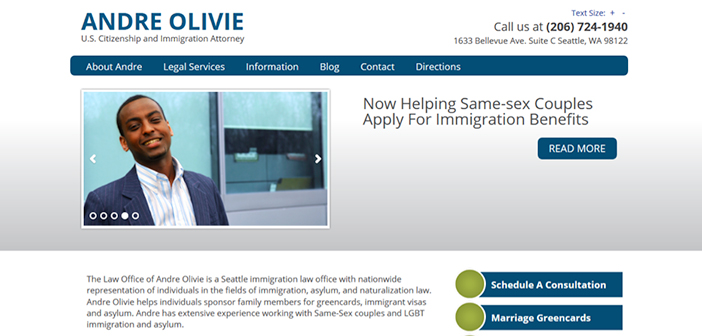After failing with flyers, social media, & his first niche, this immigration attorney found a winning path. Here are details on the avenues working for him.
Law firms have to be creative when it comes to getting the attention of potential clients. Simply posting a website or keeping a blog isn’t enough anymore.
If your firm is competing with law firms who’ve had a website for many years, then you will find it difficult to get near the top of Google search rankings. If you’re in a field that’s populated with hundreds of competing firms, you might get drowned out in the noise.
One law firm found that the best way to be truly competitive was by becoming smaller. Rather than trying to hit as many moving targets as possible with a broad marketing campaign, Andre Olivie discovered that he got the best results by focusing on a small target audience.
Background
The Law Office of Andre Olivie is an immigration-focused law firm in Seattle, Washington. Olivie began the practice in 2009, helping with green cards, asylum, naturalization law and other immigration issues. Today, the main focus of his practice is helping same-sex couples with immigration issues.
Olivie has an extensive website, a blog, business pages on Facebook and Google+, and a profile page on Avvo. But his biggest marketing success came from focusing on an immigration service that wasn’t already covered by a lot of competing attorneys: issues for gay and lesbian couples.
“90% of my clients find me online,” Olivie said. “My best tip is to focus on a niche. Being online as an immigration attorney means that many other immigration attorneys have a lengthier online presence. So I focus my blogs and my website on LGBT immigration issues, which is a unique subset.”
The Challenges
Olivie encountered quite a few difficulties when he first started because he tried to compete as a general immigration lawyer. With so many lawyers competing for the same Google search space, he wasn’t able to come out on top.
His first attempt at niche marketing involved focusing on Indian immigration. That attempt didn’t take.
“I thought I’d do an Indian niche since I’m part Indian,” he said. “But there are already lots of Indian attorneys. I tried running an ad in an Indian newspaper and on an Indian website, but that didn’t generate any results because in the Indian culture, most recommendations come from word of mouth.”
He also needed to find a niche that didn’t rely on social networking. Because Olivie doesn’t use social networking much himself, he found that trying the social networking route wasn’t the greatest choice for him.
“I don’t personally use Twitter and I’m not on Facebook enough,” he said. “I don’t do Instagram or any of those. If I were active and could get a lot of followers, it would be different. But Twitter is pointless when there’s no one to look at it.”
Olivie also had a very small budget and couldn’t rely on expensive TV ads or other high-priced marketing schemes. So he tried posting flyers that advertised his services.
“I handed out flyers when I first started out,” he said. “I walked into an ethnic grocery store and asked if I could put up a flyer. It didn’t work out too well.”
When he finally found the LGBT audience, everything clicked.
“Most of them are well educated, high income and use the Internet,” he said.
This target audience fit well with his marketing methods. And he realized that niche marketing was best for him because he’s a small firm that doesn’t need an overwhelming response to his marketing efforts.
“I don’t need all the immigration clients, just a few.”
Picking the LGBT Target Niche
Olivie picked the LGBT audience as his firm’s target niche after discovering that a big Supreme Court ruling was coming soon and would be all over the news.
The Defense of Marriage Act allowed states to not recognize same-sex marriages that were legally granted under the laws of a different state. In December 2012, the Supreme Court agreed to hear a case about DOMA. It issued its decision on June 26, 2013, ruling that Section 3 of DOMA was unconstitutional.
“I knew that once DOMA fell, people would be searching for information on it,” Olivie said.
First, he searched Google for LGBT-related issues and read articles about any problems that same-sex couples might face. Then he wrote articles on his website and his blog about those topics, such as how to get a green card for a same-sex partner. He made sure that his articles included keywords that he saw frequently when he searched Google on the topics.
Because there weren’t many immigration attorneys writing articles about DOMA-related issues, Olivie’s website turned up at the top of Google’s search list on the topic. He was ready for the ruling.
“(After the ruling) when people searched online, I’d come up ahead of other lawyers in the area, even though my website was newer,” he said. “Six months before DOMA fell, I wasn’t doing much with my website. After the DOMA ruling, I got a rush of clients who were finding me online.”
Many of his clients said that they found Olivie when they searched for “gay immigration lawyer” on Google. His website popped up first in the region.
But the result didn’t happen just from getting the right keywords on his blog. Olivie had to invest significant time in writing meaningful articles that would help answer immigration questions.
“It’s not just SEO, but also about how much effort you’re willing to put into it,” he said.
Additional Marketing Techniques
Writing engaging blog posts has been one of the main ways that Olivie gets the word out about his law firm, but he also uses a few other techniques to bring in clients. By using a variety of methods, he’s able to reach a wider audience.
Google Reviews
Although Olivie steers clear of social marketing on sites like Facebook or Twitter, he has asked a few satisfied clients to write reviews for him on Google. When someone searches for his name on Google, these reviews show up at the top of the list.
“You’ve got to ask them to write the review,” Olivie said. “If I didn’t ask my clients, they probably wouldn’t think to do it.”
Using Avvo
Olivie has spent a lot of time on Avvo, a lawyer profile and rating service. He updated his profile, added photos, requested reviews from clients and endorsements from other attorneys, and added his specialty. He currently has a 9.3 out of 10 rating.
Olivie believes that spending time on Avvo is definitely worthwhile.
“Avvo will create a profile for you whether you like it or not, because it pulls from bar records,” he said. “If you ignore it, then you’ll have no photo on there and it says ‘No rating.’ ‘No rating’ sounds almost as bad as a low rating.”
The ratings are based on a complicated algorithm that looks at how long you’ve been an attorney, any awards you’ve received, ratings from other people, and additional criteria. Olivie also spends time answering questions about immigration on Avvo. To date, he’s responded to more than 2,000 questions on the site and written four guides related to same-sex immigration.
“People use the site to ask legal questions,” he said. “Sometime people call me because they see I have high reviews and I’m answering questions. They may say, ‘I saw you answered a question and I have a similar one.’”
Website Profile
Olivie has found that his clients also appreciate the time he put into writing a profile for his website. In the profile, he talked about his background, his work with nonprofits, and his interest in human rights.
“I encourage lawyers to put a personal profile on their website,” he said. “You sound nice, like you’re a good guy and care about people. Clients have told me that they like my profile on my webpage. More than one client’s said that they put the profile into consideration (when picking an attorney.)”
Presentations
Speaking and hosting presentations about LGBT issues provided Olivie with another means for marketing his law firm. He holds joint presentations with other local attorneys or he contacts LGBT organizations and offers to give a presentation to the members about legal issues that same-sex couples might face.
He will even speak at forums held at the law school he attended or give presentations at legal conferences. Although his clients won’t be attending these attorney functions, Olivie has found that getting the word out about his specialty might encourage attorneys in the area to contact him if they run into someone who needs help from his field of expertise.
“I’m trying to get my name out with the immigration lawyers, so they’ll know this is what I do in case the topic ever comes up at their firm,” he said. “I also get referrals from non-immigration attorneys.”
Print Marketing
Although not his main focus, print marketing has helped Olivie find new clients. After the DOMA ruling, Olivie made postcards with photos of same-sex couples. On the cards, he wrote that he’s an immigration attorney and explained the DOMA ruling.
“I sent the postcards out to all the gay lawyers in my area in case they get immigration clients,” he said.
He also posted advertisements in a weekly newspaper for same-sex couples in the region.
“It’s not expensive at all, maybe less than $100 a month,” he said. “Some of my clients cut out the ad and bring it to me (when they first come.) I only need one or two clients to cover the cost of the whole ad.”
How to Get Started
Pick a Familiar Topic for Your Niche
If you’re interested in finding a niche market for your firm, there are a few steps you can take to get started. First, Olivie advises lawyers to pick a niche that they’re familiar with or have a connection to. Having a pre-existing connection with a niche will make you more trustworthy to potential clients. For example, you likely wouldn’t do as well focusing on Indian immigration if you aren’t of Indian descent yourself. Part of the reason this is important is because you won’t be able to write good articles that address the unique issues your target audience faces unless you understand them.
In addition, unless you understand your target audience, you won’t know the best way to reach them. When Olivie first tried Indian immigration, he ran into problems because such close-knit communities rely on word of mouth more than ads and Internet searches. Focusing on same-sex immigration was a better fit for finding clients by writing blog posts and updating a profile on Avvo.
Look at the Keywords Other Lawyers Use
To make sure you’re using the right keywords, try to figure out what attorneys already working with your target talk about. When you run a Google search on your target, such as searching for “LGBT immigration attorneys,” pay close attention to the first attorneys who show up. Go to their websites and read the articles and blog posts that they’ve written on the topic. Some blogs will even have visible keywords or tags listed at the bottom of each post. Take a look at the words used the most in each article, the words chosen for the headlines, and the words in the tags. You’ll want to focus on using similar keywords in your own articles and headlines.
Your choice of keyword can be subtle but important. For example, Olivie discovered that websites that talked about gay immigration issues used the word “gay” more often than “LGBT.” This helped him determine that “gay” was a better keyword for his own blog posts.
Research Relevant News Topics
Staying relevant is a huge key to showing up at the top of Google searches. Olivie knew that a DOMA ruling was coming soon, so he tailored his website for that upcoming news item. Try to do the same for your target. Will the Supreme Court or a court in your region be hearing a case in the near future on a topic that you cover? Has a big accident or recall related to your target audience recently occurred? Try searching specifically in the “News” section of Google for keywords related to your target audience, such as searching for “gay immigration.” Look for news items that are of particular interest and that might lead to people searching online for more information on the topic.
Check the news every day and if something unexpected happens in your niche, post about it immediately. For example, if your target audience was GM owners, then you’d want to write articles on a consistent basis related to the recent GM recall.
Post Blog Articles Frequently
Get into the habit of posting articles to your blog frequently and try to be creative. Don’t just post about the same obvious topic every time. Olivie comes up with unique ideas for his blog, such as how to get green cards for same-sex couples, how policies post-DOMA are changing, and how to help gay Russians get asylum in the United States.
You can come up with creative ideas by researching the topic and reading what types of articles journalists, lawyers and bloggers have written concerning your target niche. By going beyond just reading other lawyers’ blogs, you’ll be more likely to come up with creative ideas for your own.
Get Reviews
Even if you don’t want to engage in social networking, it’s a good idea to get high ratings on a few review sites. Google reviews should be your top pick. Because Google wants its own services to get top billing on a Google search, any reviews written for Google will show up at the top of a search result for your law firm or your name. Just ask some of your satisfied clients to leave positive reviews for you on Google. Set up a Google+ page for your firm so it’s easier for them to find where to post these reviews.
Like Olivie suggests, update your Avvo page with a profile photo and information about yourself. Then spend time answering questions. A good ranking on Avvo combined with demonstrating that you take an active interest in helping others can make a big difference when potential clients are trying to decide which attorney to contact.
Conclusion
Being a small firm doesn’t have to be a disadvantage. In fact, with the right marketing techniques you can make it a selling point for clients. Instead of trying to hit every market within your legal field, focus on a target niche.
Olivie said having a small, targeted niche market makes him more competitive and complements his solo practice nicely.
“My clients like me because I’m personal,” he said. “They like that I have a small office and that I’m not in a big law firm. I’m not stuffy. I try to portray that image. I don’t want to seem like I’m above them; I like to keep things casual.”




